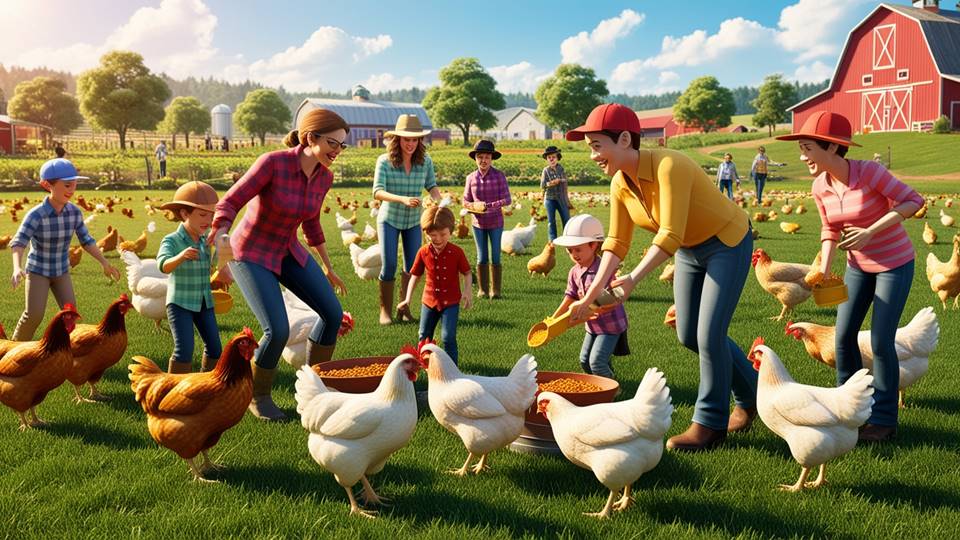- Why Farm Tours Matter
- Key Benefits of Farm Tours
- Organizing Farm Tours: Step-by-Step
- Creating Engaging Experiences
- Marketing Your Farm Tours
- Ensuring a Safe and Enjoyable Experience
- Educational and Interactive Elements
- Overcoming Challenges in Farm Tours
- Maximizing Engagement and Loyalty
- Case Study: A Successful Farm Tour
- Measuring Success
- Final Tips for a Memorable Farm Tour
- Leveraging Farm Tours for Long-Term Benefits
- Closing Thoughts
Farm tours have emerged as a unique and effective strategy to strengthen customer relationships and foster loyalty in sustainable agriculture, particularly organic chicken farming. These tours bridge the gap between farmers and consumers, offering an authentic glimpse into farm operations. This article explores how organizing farm tours can enhance customer engagement and provides a step-by-step guide to effectively plan and execute them.
Why Farm Tours Matter
Farm tours create a platform for transparency, building trust among consumers. By showcasing sustainable practices and the quality of organic chicken farming, these tours educate visitors about the benefits of choosing ethical, eco-friendly food sources. For farmers, they provide an opportunity to connect with customers, answer queries, and directly promote products like eggs, chickens, or farm-to-table offerings.
Key Benefits of Farm Tours
- Strengthening Customer Trust
Transparency is a cornerstone of customer loyalty. Farm tours allow visitors to witness firsthand the care and attention given to chickens in organic setups. They gain insight into natural feeding practices, eco-friendly coops, and sustainable waste management, enhancing their trust in your brand.
- Promoting Sustainable Farming
Visitors leave with a deeper appreciation of sustainable agriculture. Highlight practices like predator management and eco-friendly coop construction, which demonstrate your commitment to environmental stewardship. Read more about managing predators here.
- Offering Unique Experiences
Farm tours provide memorable experiences, such as feeding chickens or collecting eggs. These activities encourage word-of-mouth marketing and repeat visits. For example, a well-organized event featuring different chicken breeds can highlight their role in sustainable farming (see the best breeds here).
Organizing Farm Tours: Step-by-Step
- Identify Your Goals
Before organizing a tour, define its purpose. Are you aiming to educate, sell products, or build brand awareness? Understanding your goals will help structure the event to meet customer expectations.
- Plan the Tour Route
Select areas of your farm to showcase, such as the chicken coops, feed storage, or organic garden. Ensure these areas are safe and presentable. For inspiration, visit other farms or research sustainable practices (learn more).
- Highlight Unique Selling Points
Focus on what sets your farm apart, such as unique chicken breeds, innovative coops, or your journey to avoid common farming mistakes (avoid these mistakes).
- Prepare an Itinerary
A clear schedule ensures a smooth experience. Include welcome sessions, guided tours, Q&A segments, and tasting opportunities. For example:
- 10:00 AM – Arrival and Welcome
- 10:15 AM – Tour of Chicken Coops
- 11:00 AM – Feeding Demonstrations
- 12:00 PM – Product Sampling and Q&A
Creating Engaging Experiences
- Hands-On Activities
Engage visitors with activities like egg collection or preparing natural chicken feed (feeding practices). These interactive sessions foster a deeper connection with your farm.
- Storytelling
Share your journey as a farmer, including challenges and achievements. Authentic stories resonate with audiences and personalize their experience.
- Educational Displays
Use infographics or videos to explain processes like composting or managing chicken health. Visual aids can simplify complex topics, enhancing visitor understanding and retention.
Marketing Your Farm Tours
- Leverage Social Media
Promote your tours through Instagram or Facebook. Share videos of past events, testimonials, and behind-the-scenes preparations. Learn effective marketing strategies.
- Collaborate with Local Businesses
Partner with nearby organic markets or eco-friendly brands to cross-promote your tours. Collaborations increase reach and attract like-minded customers.
- Offer Incentives
Encourage participation by offering discounts on farm products or free samples during the tour.
Ensuring a Safe and Enjoyable Experience
- Prioritize Visitor Safety
Safety is crucial when inviting the public onto your farm. Here are some considerations:
- Clean and Organized Premises: Ensure the farm is tidy and free from hazards like loose wires, sharp tools, or slippery paths.
- Safety Gear: Provide gloves, masks, or boots if visitors are involved in activities like handling feed or collecting eggs.
- Signage: Use clear signs to mark restricted areas, such as machinery zones or predator control sections.
- Handle Live Animals Responsibly
Interacting with live animals can be a highlight of the tour, but it requires careful planning:
- Designate a handler to oversee activities involving chickens.
- Limit direct contact with animals to reduce stress and maintain their health.
- Share guidelines for respectful interaction, such as avoiding loud noises or sudden movements.
- Accessibility for All
Consider visitors of varying ages and physical abilities:
- Create clear, level pathways for strollers and wheelchairs.
- Provide shaded rest areas with seating for elderly or less mobile participants.
- Offer alternative activities for those unable to participate in hands-on segments.
Educational and Interactive Elements
- Demonstrations
Practical demonstrations captivate visitors and enhance learning. Examples include:
- Organic Feed Preparation: Showcase how to mix natural, nutrient-rich feed (read more here).
- Predator Deterrence: Explain techniques for protecting chickens from predators, using visuals or mock setups (learn about predator management).
- Information Boards and Visuals
Incorporate visuals to make your tour informative and engaging:
- Infographics: Create charts detailing the lifecycle of chickens or the benefits of organic farming.
- Interactive Maps: Design a farm map highlighting tour stops, coops, and key features.
- Videos: Set up a screen showcasing farm processes or success stories.
- Guided Discussions
Invite questions during and after the tour to encourage dialogue. Be prepared to discuss topics like:
- The role of sustainable farming in reducing environmental impact.
- How organic farming benefits human health (read more here).
Overcoming Challenges in Farm Tours
- Weather Considerations
Outdoor activities are susceptible to weather disruptions:
- Plan alternative indoor activities in case of rain, such as cooking demonstrations or workshops.
- Provide umbrellas or ponchos for light rain conditions.
- Managing Large Groups
Handling many visitors requires organization:
- Divide attendees into smaller groups for guided tours.
- Stagger arrival times or offer multiple tour slots throughout the day.
- Balancing Work and Tours
Farm operations can’t come to a halt during tours. Strategies include:
- Scheduling tours during slower farming periods.
Assigning specific staff or family members to guide visitors.
Maximizing Engagement and Loyalty
- Encourage Feedback
After the tour, ask visitors to share their experiences:
- Provide a feedback form or online survey.
- Use positive feedback as testimonials to promote future tours.
- Build a Community
Foster long-term relationships by inviting visitors to join your mailing list or social media groups. Regular updates about farm events or product availability keep your brand top of mind.
- Offer Membership Programs
Introduce exclusive perks for frequent visitors, such as:
- Discounts on farm products.
- Early access to events.
- Invitations to members-only workshops or tours.
Case Study: A Successful Farm Tour
Consider this scenario:
- The Situation: A small organic chicken farm wanted to boost direct sales and educate locals about sustainable farming.
- The Approach: They organized monthly tours featuring interactive activities like egg collection, feeding demonstrations, and Q&A sessions. Visitors enjoyed samples of fresh farm produce and received discount vouchers.
- The Outcome: The farm reported a 30% increase in product sales and built a loyal customer base through repeat visits.
Measuring Success
- Attendance Numbers
Track the number of participants to assess the event’s popularity.
- Post-Event Sales
Monitor sales spikes after the tour to gauge customer interest in your products.
- Social Media Mentions
Encourage visitors to share their experiences online. Increased mentions and tagged photos indicate strong engagement.
Farm tours are a transformative tool for organic chicken farmers to enhance customer engagement, build trust, and grow their brand. By effectively showcasing sustainable practices and offering immersive experiences, farmers can forge lasting relationships with their audience. To conclude, let’s summarize the key takeaways and offer final thoughts on organizing impactful farm tours.
Final Tips for a Memorable Farm Tour
- Use Storytelling to Make an Impact
Sharing your farm’s story — its beginnings, challenges, and achievements — can create an emotional connection with your audience. Highlight milestones such as adopting sustainable practices or overcoming common farming mistakes. Incorporate visuals or before-and-after photos to make your narrative even more compelling.
- Highlight Your Unique Value
Every farm has something unique to offer. Whether it’s rare chicken breeds, innovative feed practices, or a picturesque landscape, emphasize what sets your farm apart. Visitors will remember and share these standout features.
- Maintain a Focus on Education
Ensure every segment of the tour educates visitors about organic farming. Provide take-home materials, such as brochures or QR codes linking to articles like Starting Your Own Organic Chicken Farm or Effective Marketing for Natural Chicken Products.
Leveraging Farm Tours for Long-Term Benefits
Farm tours offer more than just short-term engagement; they create opportunities for long-term benefits:
- Increased Sales: Engaged customers are more likely to buy your products and recommend them to others.
- Enhanced Reputation: A well-organized tour positions your farm as a leader in sustainable and organic farming.
- Community Building: By inviting locals to your farm, you strengthen ties with your community and promote collective support for sustainable agriculture.
Closing Thoughts
Organizing farm tours might seem daunting initially, but the benefits far outweigh the challenges. They offer a unique way to educate, inspire, and connect with your audience while promoting your organic farming practices. By incorporating thoughtful planning, engaging activities, and clear communication, you can turn visitors into loyal customers and advocates for your brand.


